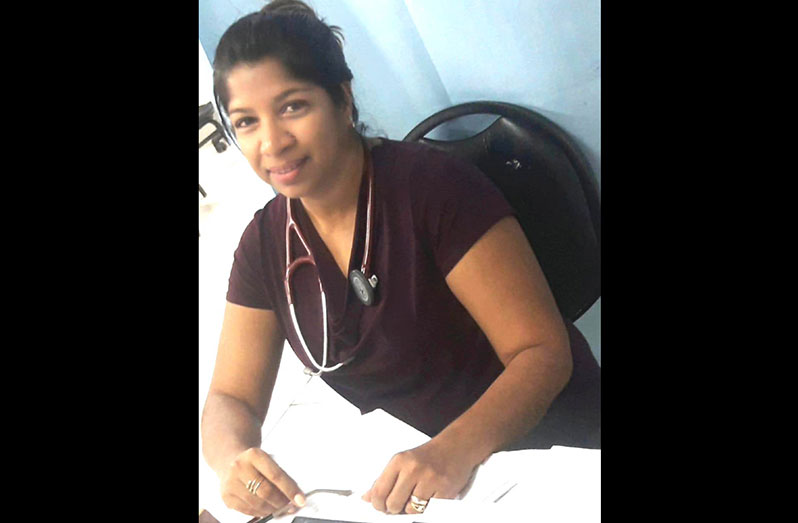Local doctor pursues Haematology after noticing the need among patients
DR. Kamela Bemaul-Sukhu is the country’s one and only haematologist who decided to pursue studies in the field purely because she was drawn in by the number of patients she knew she could help, but just didn’t have the medication or mode of diagnosis available.
She discussed her plans to study Haematology with the authorities at the Georgetown Public Hospital Corporation (GPHC), who then arranged for her scholarship to study in Canada. Once she gained the speciality, she returned about two years ago and started up the Haematology Clinic and Department at the GPHC.
According to a Johns Hopkins report, Haematology is the study of blood and blood disorders. “Haematologists…are highly trained healthcare providers who specialise in diseases of the blood and blood components. These include blood and bone marrow cells,” the report explained, adding, “Haematological tests can help diagnose anaemia, infection, haemophilia, blood-clotting disorders, and leukaemia.”

Being in internal medicine, Dr. Sukhu saw first-hand how people suffered from blood-related problems because there was no specialised person to deal with their conditions. “These things required people who are specialised in these disorders, but we didn’t have anyone. Not having the speciality means treatment was also not available,” she explained in an interview with the Pepperpot a few days ago.
“You will see someone bleeding profusely; it could’ve been so many reasons why they’re bleeding, but because there was no haematologist around, the testing that is required to diagnose these patients specifically was not available,” she explained.
Having completed her studies, Dr. Sukhu informed the hospital and lab of what tests and medications she would require to diagnose and treat her patients and thus got the ball rolling with the clinic.
“I’ve seen patients suffer and how an exact medication can turn their lives around. There was this guy who was bedridden for more than a month; the blood count was so low he was bleeding all the time and was just being given blood products. But he wasn’t getting better until we gave him another medication that was right for him,” she reflected.

Seeing that people were so helpless because of not having a speciality doctor around; and knowing that she could make a difference if she had access to the right equipment and medication prompted Dr. Sukhu to further her studies in Haematology.
“A lot of people have bleeding disorders but think they’re normal. Females will have heavy bleeding at certain times of the month and think that’s normal. Really, there is a certain amount of bleeding that should take place during this time and anything above that needs to be investigated. People will also have low blood counts, low iron for years and years, and don’t even know it because they are not being diagnosed.
Thanks to work being done at the clinic, these and other related situations can be sorted out.
COVID-19 and Blood Clots
Dr. Sukhu has shared that it is imperative for persons to be vaccinated as COVID is high risk for blood clots and bleeding. “Every week, I’ll see persons with blood clots who’ve had COVID. Because of COVID, people are afraid to take the vaccine, but taking the vaccine lessens the severity of your infection,” she explained.

She stressed that those unwilling to be vaccinated against COVID place themselves at an increased risk. “So if you have bleeding disorders, you should still get your vaccine because if you do get COVID, then your bleeding disorder can actually be worse. If you’re at risk for blood clots, then you should still get your vaccine because COVID actually increases your risk.”
Meanwhile, according to an article by Medical News Today, problems with the blood can affect several of the body’s systems, such as the lymphatic system, a network of tissues and organs that clear waste. Blood disorders sometimes stem from problems with the bone marrow, where the body makes most of its blood cells.
Haematology, the publication states, aims to understand how these problems occur, how they affect a person’s health, and how to treat them.
Some tests and procedures that a Haematologist may perform include complete blood cell count (This test can help diagnose anaemia, inflammatory diseases, and blood cancer. It can also help with monitoring blood loss and infection); Platelet count (This test helps diagnose and monitor bleeding disorders); Blood enzyme tests (a doctor uses to help diagnose cardiovascular conditions, including heart attacks); Bone-marrow biopsy (This procedure can help diagnose and monitor anaemia, thrombocytopenia, which involves having a low platelet count, and some cancers); and blood transfusions (This involves the body receiving healthy blood intravenously — through an IV).




.jpg)










